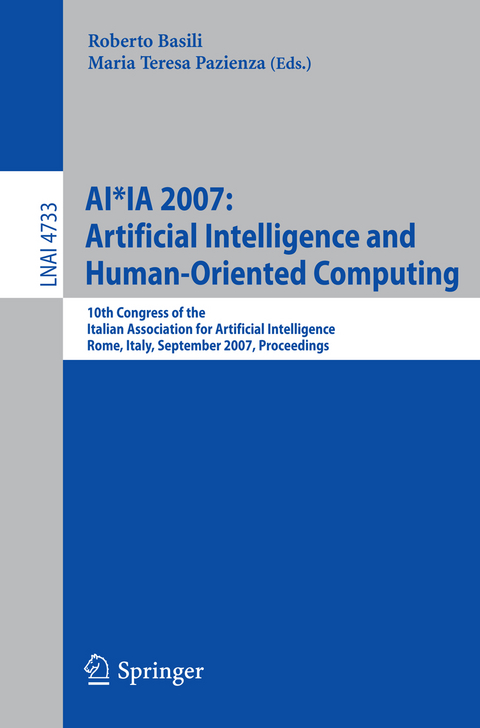
AI*IA 2007: Artificial Intelligence and Human-Oriented Computing
Springer Berlin (Verlag)
978-3-540-74781-9 (ISBN)
Invited Talks.- Learning to Select Team Strategies in Finite-Timed Zero-Sum Games.- Expressive Intelligence: Artificial Intelligence, Games and New Media.- Artificial Ontologies and Real Thoughts: Populating the Semantic Web?.- Knowledge Representation and Reasoning.- Model-Based Diagnosability Analysis for Web Services.- Finite Model Reasoning on UML Class Diagrams Via Constraint Programming.- Model Checking and Preprocessing.- Some Issues About Cognitive Modelling and Functionalism.- Understanding the Environment Through Wireless Sensor Networks.- An Implementation of a Free-Variable Tableaux for KLM Preferential Logic P of Nonmonotonic Reasoning: The Theorem Prover FreeP 1.0.- Ranking and Reputation Systems in the QBF Competition.- A Top Down Interpreter for LPAD and CP-Logic.- Multiagent Systems, Distributed AI.- A Multi-layered General Agent Model.- Goal Generation with Ordered Beliefs.- Verifying Agent Conformance with Protocols Specified in a Temporal Action Logic.- Knowledge Engineering, Ontologies and the Semantic Web.- Harvesting Relational and Structured Knowledge for Ontology Building in the WPro Architecture.- English Querying over Ontologies: E-QuOnto.- Use of Ontologies in Practical NL Query Interpretation.- Machine Learning.- Evolving Complex Neural Networks.- Discovering Relational Emerging Patterns.- Advanced Tree-Based Kernels for Protein Classification.- A Genetic Approach to the Automatic Generation of Fuzzy Control Systems from Numerical Controllers.- Trip Around the HMPerceptron Algorithm: Empirical Findings and Theoretical Tenets.- Instance-Based Query Answering with Semantic Knowledge Bases.- A Hierarchical Clustering Procedure for Semantically Annotated Resources.- Similarity-Guided Clause Generalization.- Structured Hidden Markov Model: A General Framework for Modeling Complex Sequences.- Nearest Local Hyperplane Rules for Pattern Classification.- Natural Language Processing.- The JIGSAW Algorithm for Word Sense Disambiguation and Semantic Indexing of Documents.- Data-Driven Dialogue for Interactive Question Answering.- GlossExtractor: A Web Application to Automatically Create a Domain Glossary.- A Tree Kernel-Based Shallow Semantic Parser for Thematic Role Extraction.- Inferring Coreferences Among Person Names in a Large Corpus of News Collections.- Dependency Tree Semantics: Branching Quantification in Underspecification.- Information Retrieval and Extraction.- User Modelling for Personalized Question Answering.- A Comparison of Genetic Algorithms for Optimizing Linguistically Informed IR in Question Answering.- A Variant of N-Gram Based Language Classification.- Planning and Scheduling.- SAT-Based Planning with Minimal-#actions Plans and "soft" Goals.- Plan Diagnosis and Agent Diagnosis in Multi-agent Systems.- Boosting the Performance of Iterative Flattening Search.- Real-Time Trajectory Generation for Mobile Robots.- AI and Applications.- Curricula Modeling and Checking.- Case-Based Support to Small-Medium Enterprises: The Symphony Project.- Synthesizing Proactive Assistance with Heterogeneous Agents.- Robust Color-Based Skin Detection for an Interactive Robot.- Building Quality-Based Views of the Web.- Special Track: AI and Robotics.- Reinforcement Learning in Complex Environments Through Multiple Adaptive Partitions.- Uses of Contextual Knowledge in Mobile Robots.- Natural Landmark Detection for Visually-Guided Robot Navigation.- Real-Time Visual Grasp Synthesis Using Genetic Algorithms and Neural Networks.- Attention-Based Environment Perception in Autonomous Robotics.- A 3D Virtual Model ofthe Knee Driven by EMG Signals.- Special Track: AI and Expressive Media.- 'O Francesca, ma che sei grulla?' Emotions and Irony in Persuasion Dialogues.- Music Expression Understanding Based on a Joint Semantic Space.- Towards Automated Game Design.- Tonal Harmony Analysis: A Supervised Sequential Learning Approach.- Words Not Cast in Stone.- Special Track: Intelligent Access to Multimedia Information.- Annotations as a Tool for Disclosing Hidden Relationships Between Illuminated Manuscripts.- Mining Web Data for Image Semantic Annotation.- Content Aware Image Enhancement.- Semantic Annotation of Complex Human Scenes for Multimedia Surveillance.- Synthesis of Hypermedia Using OWL and Jess.- NaviTexte, a Text Navigation Tool.- TV Genre Classification Using Multimodal Information and Multilayer Perceptrons.- Posters.- Hierarchical Text Categorization Through a Vertical Composition of Classifiers.- Text Categorization in Non-linear Semantic Space.- A System Supporting Users of Cultural Resource Management Semantic Portals.- Interactive Analysis of Time in Film Stories.- Towards MKDA: A Knowledge Discovery Assistant for Researches in Medicine.- Mobile Robots and Intelligent Environments.- Multi-robot Interacting Through Wireless Sensor Networks.- Design of a Multiagent Solution for Demand-Responsive Transportation.- Planning the Behaviour of a Social Robot Acting as a Majordomo in Public Environments.- Enhancing Comprehension of Ontologies and Conceptual Models Through Abstractions.- Recognizing Chinese Proper Nouns with Transformation-Based Learning and Ontology.- Toward Image-Based Localization for AIBO Using Wavelet Transform.- Crosslingual Retrieval in an eLearning Environment.- Constraint-Based School Timetabling Using Hybrid Genetic Algorithms.
| Erscheint lt. Verlag | 28.8.2007 |
|---|---|
| Reihe/Serie | Lecture Notes in Artificial Intelligence | Lecture Notes in Computer Science |
| Zusatzinfo | XVII, 862 p. |
| Verlagsort | Berlin |
| Sprache | englisch |
| Maße | 155 x 235 mm |
| Gewicht | 1303 g |
| Themenwelt | Informatik ► Software Entwicklung ► User Interfaces (HCI) |
| Informatik ► Theorie / Studium ► Künstliche Intelligenz / Robotik | |
| Schlagworte | Agent Systems • AI logics • Algorithmic Learning • Artificial Intelligence • Cognitive Modeling • Complexity • Computational Intelligence • computational lingujistics • Constraint Satisfaction • Data Mining • distributed AI • Genetic algorithms • Hardcover, Softcover / Informatik, EDV/Informatik • HC/Informatik, EDV/Informatik • Heuristics • humann-robot interaction • Intelligence • Intelligent Systems • Knowledge • Knowledge Discovery • Knowledge Engineering • Knowledge Representation • learning • machine learning • Model Checking • Multi-agent Systems • Multimedia • Neural networks • Neurolinguistisches Programmieren (NLP) • NLP • Ontologies • Ontology • robot • Robotics • Scheduling • Semantics • semantic web • Speech Recognition • theorem proving |
| ISBN-10 | 3-540-74781-8 / 3540747818 |
| ISBN-13 | 978-3-540-74781-9 / 9783540747819 |
| Zustand | Neuware |
| Haben Sie eine Frage zum Produkt? |
aus dem Bereich


